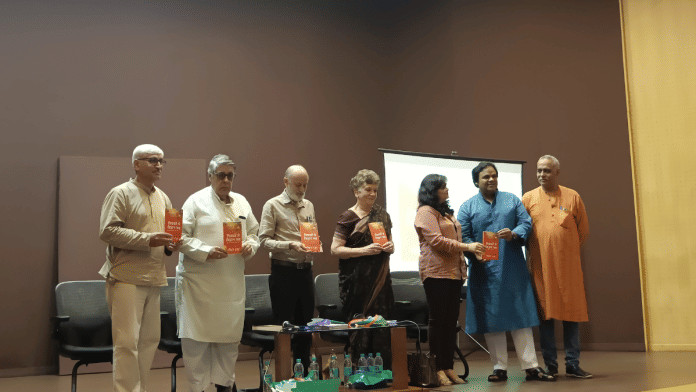New Delhi: Around 1990, Indian scientist Gauhar Raza visited the Kumbh Mela for a survey. Upon being asked why an object fell toward the ground when tossed in the air, the respondents borrowed from various myths to explain the cause. Raza was astonished.
Then he studied the myths of various ancient and modern civilisations, from Mesopotamia, Africa, and Rome to Greece and tribal belts. He concluded that all had similarities and learned a lot from each other.
“These myths have reached us over thousands of years,” said Raza recently during the launch of his new book, titled Mythakon se Vigyan Tak, at Delhi’s Jawahar Bhawan.
The book gives a historical account of the development of science, scientific consciousness, and myths across ancient civilisations.
Raza gave an example of an African myth. He said that Africans believed that God first created a drop of milk, from which He created stone and then people. From iron, He created fire, water, air, and then combined all to create human beings.
Raza also mentioned that while the Indian civilisations talked about five elements — panch tatva — the Greeks mentioned four.
The large auditorium at Jawahar Bhawan was fully packed with university students, scientists, professors, and activists. Raza was joined by professors Neera Chandhoke, Purushottam Agrawal, and Apoorvanand as a moderator.
Apoorvanand said that scientific consciousness is not entirely about science — those involved in this business often have little scientific sensitivity.
“It is often seen in universities that people in science departments are mostly conformists who follow the administration,” he said.
Also read: British photographers showed sites of 1857 violence, without people. They erased Indians
Intersection of science and religion
Agrawal said that human beings cannot imagine a single moment of their lives without science but are most attached to the technological aspect of it. He was concerned about how myths are misused in the name of religion.
Agrawal quoted Marxist philosopher Frederich Engels: “As science progresses, religion will weaken”, adding that in the 21st century, everyone is troubled by the terror of religion. “Unless we address the complex role of religion, we cannot stop [its] negative role,” he said.
Chandhoke emphasised that while science and religion are often seen as binary opposites, both are deeply concerned with human ethics and the pursuit of knowledge, though through different methodologies.
She highlighted the resurgence of ritualism and superstition within modern Hinduism, contrasting it with the more rationalistic approach of 19th-century Hindu revivalism.
“When you look at the philosophy of science, you realise that actually this whole notion of religion and science is a 19th-century invention. Until the 19th century, science was a natural philosophy,” she said, adding that she couldn’t think of a single political philosopher who was not a scientist.
Chandhoke, mentioning the name of English philosopher and scientist Thomas Hobbes, said his entire philosophical ethics were based on geometry. She urged a balanced perspective that recognises the importance of dialogue and imagination in resolving the dilemmas of human life, rather than relying solely on rigid, mechanical thinking.
“Human life is chaotic and unpredictable. A dilemma [that] can never be solved. It can only be resolved,” she said.
One of the audience members asked Raza what they could do to start a dialogue on the subject — people become very aggressive when any discussion turns to religion.
“To move a conversation forward, at least one of the two people must be a communicator,” replied Raza.
(Edited by Humra Laeeq)






